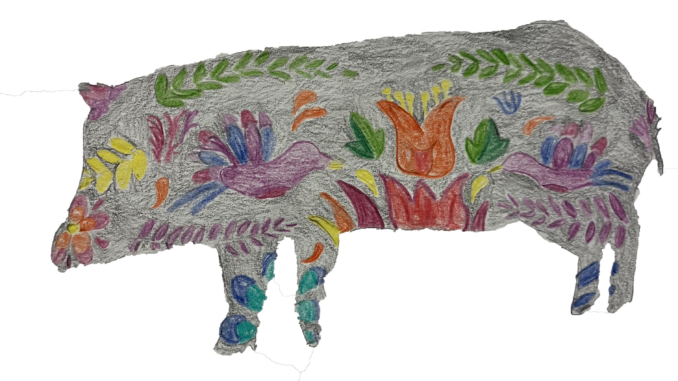
I had the privilege of attending the Portland Indigenous Marketplace, a two-day event hosted at the Native Arts and Culture Center (NACC) in the Belmont neighborhood. Once the Yale Laundry Building, NACC is now a spacious, brick building that hosts exhibitions and community events that uplift local Native artists and culture-bearers.
When I entered the marketplace I was greeted by joyous music, courtesy of the in-house DJ, with families and people of all ages meandering through the rooms, food or art in hand. Artists and entrepreneurs sold a variety of goods, from hand-beaded jewelry, clothing, incense and oils, to baked goods, representing the vast array of Native businesses in the Portland area.
Javelina, a local pop-up restaurant serving Indigenous comfort food, was the primary reason I made the trek (a Pio ride and a 30-minute walk) to the market. Despite the profound historical and current ties that Indigenous people have to Portland, Javelina is the only restaurant in the city to celebrate Native cuisine.
The Portland Metro area occupies the land of the Multnomah, Wasco, Cowlitz, Kathlamet, Clackamas, Bands of Chinook, Tualatin, Kalapuya and Molalla peoples. Due to the Oregon government’s specific history with Indian policy (Federal Indian Relocation Act, Oregon Termination Act, Restoration), large Indigenous populations migrated to big cities rather than staying on the government-dictated reservations. Today, Portland has the nation’s ninth-largest urban Native American population, with approximately 40,000 Native residents.
Javelina’s Co-Owner and Head Chef, Alexa Numkena-Alexander, was born and raised in Yakima, Washington on the Yakama reservation, is a member of the Hopi tribe and holds ties to the Cree and Skokomish as well. Numkena-Alexander worked in prestigious restaurants throughout Portland before deciding to open a restaurant of her own.
For those not familiar with the pop-up concept, it is a restaurant that does not have a permanent kitchen or storefront, and will “pop up” at various venues on a rotating basis. Since its first service in November 2023, Javelina has attracted a cult-like following, selling out within hours. Blogs like “Eater” and “Street Roots,” have praised the restaurant, and for good reason. Oregon Public Radio recently featured Javelina on their video series “Superabundant.”
Javelina’s menu varies on the event, as well as seasonality of ingredients, reflecting the traditional Native foodways. Proteins are local and fresh, from Chinook salmon and Steelhead trout to elk sandwiches and wild rabbit. Prepared with traditional methods of braising, steaming, smoking and wide usage of Native vegetables and aromatics, each dish connects the eater to food that holds cultural significance.
Javelina does not shy away from foods that are newer in the canon of Indigenous eating, despite the painful history in which they were created. Fry bread, for example, is always featured in some variation on the menu, and dishes like the powwow burger, Indian “Ndn” taco or Sonoran hot dog also echo the impacts of colonization on the cuisine.
Fry bread may appear as just an innocuous fried dough, but its invention and cultural significance tracks a history of resilience in the face of colonization. Its origins are generally attributed to the Navajo nation, when they were forcibly removed from their ancestral homes to reservations. Torn from the land that provided their communities with nourishment for centuries, the Navajo and tribes across the U.S. had to rely on government rations; flour, salt, sugar and oil were common. From then on, fry bread made from these ingredients became an essential part of the diet and culture.
In Numkena-Alexander’s interview with Oregon Public Broadcasting, she expanded on the personal significance of fry bread on the menu.
“We lost a lot of our food identity, so we want to reclaim all these Indigenous ingredients, but fry bread still has a special place in my heart. It reminds me of my grandma, and grandpa who is now passed away,” said Numkena-Alexander.
Javelina’s fry bread lived up to the rave — I was delighted by the crisp exterior and soft bite of the dough, a side of which was $5. I also tried the rabbit and wild rice soup ($10), a comforting broth with a variety of textures from the wild rice, carrots and root vegetables. The soup was the right balance of gentle and savory to highlight the star of the show: rabbit and wild rice.
The true beauty that I experienced while eating at Javelina was not just the food, but the community. Waiting in line, there was a palpable excitement, strangers turning to each other and talking about what they were ordering, or how they had been waiting for a chance to finally try the pop-up. While I waited for my order, someone asked me if I had eaten their food before and commented on how this was their second time coming. Native or not, people were excited about engaging with food that is grounded in community. Javelina is creating space for Indigenous culture to be publicly honored as a valuable and complex cuisine.
If you want to try a side of fry bread yourself, or any other delicious offerings at Javelina, be sure to follow them on Instagram @javelina.pdx. Javelina will have a pop-up at Street Disco on April 24 and another on April 29 at Magna Kusina. If you do plan on going, make sure to get there early before they sell out!
Subscribe to the Mossy Log Newsletter
Stay up to date with the goings-on at Lewis & Clark! Get the top stories or your favorite section delivered to your inbox whenever we release a new issue.

Leave a Reply